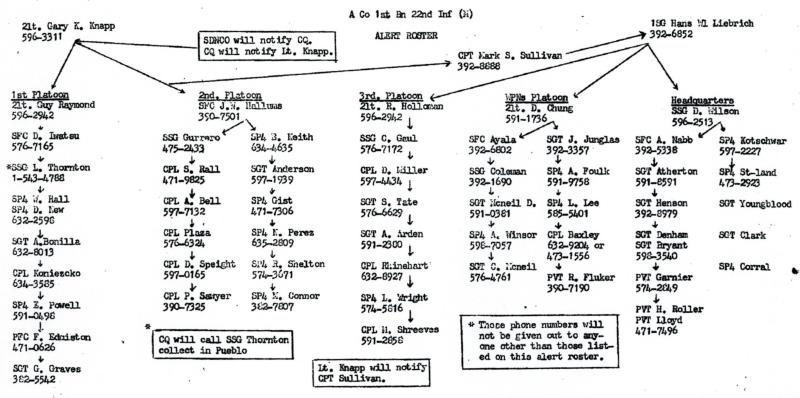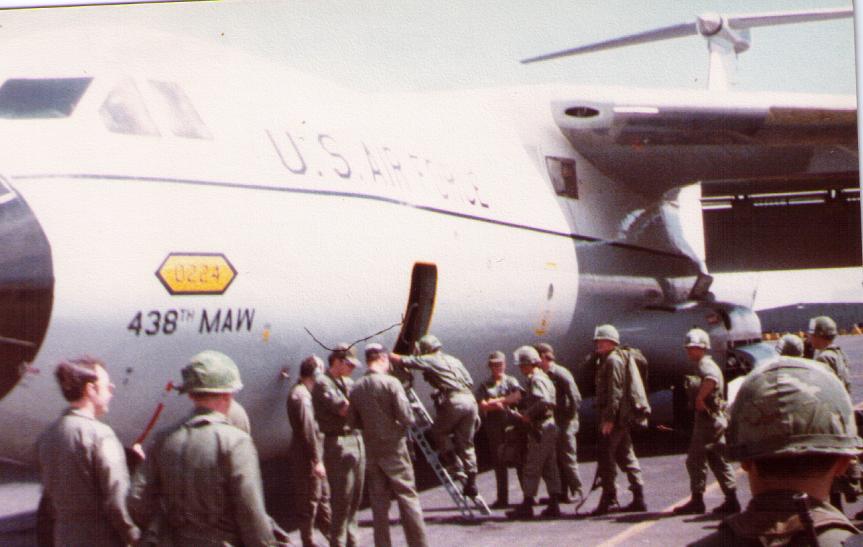![]() 1st Battalion 22nd Infantry
1st Battalion 22nd Infantry ![]()
1st Battalion 22nd Infantry - Fort Carson 1972-1984
Overview
Recruiting
poster for the US Army, |
A US Army advertisement in the |
Overview
In January of 1972 the 1st Battalion 22nd
Infantry finally rotated home to the continental United States,
after serving
in the Republic of Vietnam for nearly six years. The 4th Infantry
Division had returned to the US in December of 1970,
and a little over a year later 1st Battalion rejoined the
Division, at Fort Carson, Colorado.
In 1973 the draft was ended and
the Army began moving into its future of an all-volunteer force.
The 4th Division had become mechanized, and so, of course did the
Battalion. With the end of the Vietnam war, the Army refocused
its priorities
into the preparation for fighting a conventional war in Europe
against the Soviet Bloc. After being a Light Infantry Battalion
for so many years,
the Regulars of 1/22 Infantry mounted M113 Armored Personnel
Carriers and trained in mechanized infantry tactics.
It was during this time that the 4th Infantry Division changed
its nickname from the traditional "Ivy" Division,
to the modern "Ironhorse" Division ( a nickname that
still stands nearly forty years later ).
Mike Brewer, who became part of
1/22 Infantry in early 1975, gives the following description of
the Battalion's history
during the years 1975-1978:
"I arrived at Ft.
Carson from AIT at Ft. Polk, LA in mid-April, 1975 and was
immediately assigned to Weapons Plt (81mm mortars),
Co B, 1/22 Inf. At that time, the 1/22 was garrisoned in WWII-era
barracks known as the "mule barns". The battalion
remained
in the mule barn area until spring, 1976 when it moved into
newly-completed barracks. Also in the spring of 1976, the 1/12
Inf,
also a mule barn occupant, was assigned to Wiesbaden, Germany as
a 6-month TDY. The 1/22 was informed that it would be replacing
the 1/12 in Germany for its own TDY, but it was soon revealed
that the 1/22's redeployment would actually be a PCS.
Consequently, on October 23, 1976, the main body of the battalion
was loaded up on passenger aircraft at Peterson Field,
flown to Detroit for a short fuel-stop/layover and then on to
Rhein-Main airport in the Federal Republic of Germany.
At that time the 1/22 was re-designated as the 2/22, and the
1/12, returning to Ft. Carson from Wiesbaden,
was re-designated the 1/22. As I understand it, the 2/22 remained
in Germany until 1984.
I remained with the unit until I re-enlisted and returned to the
US in December, 1978."
The US Army during this era was
constricted by severe budget cuts imposed after the end of the
Vietnam war,
and during the 1970's it operated mostly with equipment nearing
the end of its usefullness. The 1980's brought an increase
in defense spending and the introduction of new equipment and
technology.
During the years 1972 to 1984,
as part of the 4th Division, the 1st Battalion 22nd Infantry was
part of the Soldiers who tested and adopted
new equipment and tactics for the Army, including, but not
limited to, such items as the M16A2 rifle (1982) , the M2 Bradley
fighting vehicle (1979-1983),
the PAGST kevlar helmet (1983), and camouflage BDU uniforms
(November 1979). The Battalion constantly trained at Fort Carson,
learning and sometimes inventing the mechanized tactics which it
would employ should it be called to war. And, in the event of
war,
1st Battalion 22nd Infantry would have been among the first to
go, whether that war be a conventional or nuclear conflict.
Tension between the two super
powers continued to rise during the 1970's and 1980's, and
nuclear war
was always a possibility. 1/22 Infantry constantly trained to
operate and survive on a nuclear battlefield.
"Red Devil was the training facility down range at
Carson. It had Little Vietnam and the Escape and Evasion training
sites.
There was always a 'Warsaw Pact Brigade' down range to be the
'aggressors' when we would train.
Back then Russia and the Red Presence was our enemy. We always
trained for a big tank battle in Eastern Europe.
That is why we had Reforger exercises. I was in Reforger
'77." --- SGT Terry Kotschwar Co. A 1/22 INF 1976-79
The Battalion also participated
at least once in the annual Reforger exercises, in which entire
Brigades and even Divisions
were airlifted overseas to Germany, to take part in maneuvers and
war games in Europe, as rehearsals for possible conflict there.
During these years 1st Battalion
was always prepared to be alerted for movement anywhere in the
world, should war break out,
or should US forces be needed to meet some crisis. As one of the
largest Divisions in the Army at that time,
4th Infantry Division was consistently alerted for possible
deployment, and the Soldiers of 1/22 Infantry
came to view these alerts as part and parcel of their regular
routine.

Alert Roster for Company A 1/22
Infantry, Fort Carson 1976-1979.
Note the Mechanized designation (M) of A Co 1st Bn 22nd Inf (M)
Courtesy of Terry Kotschwar, Company A 1/22 Infantry 1976-1979
"The alert roster
was for when the 'flag' went up and we were called by the country
to mobilize immediately.
We were constantly loaded on C-141's for deployment to areas of
the world. I remember getting loaded no less than 7 times.
Panama was a hotspot WAAAAY before it finally blew up, but the
country wasn't told how close we were to being sent.
I was called on the alert roster a minimum of every month. We had
to dress with all our LBE and bags packed as if we were going to
war.
It got really old." --- SGT Terry Kotschwar Co. A 1/22 INF
1976-79

1/22 Infantry loading onto a C-141
transport at Peterson Air Force Base, Colorado Springs.
Photo may have been taken prior to departing for Reforger 77.
Photo courtesy of Terry Kotschwar, Company A 1/22 Infantry 1976-1979
**********************
The VOLAR Concept Program
( The VOLAR program lasted for a year and a half, and 1/22 Infantry only participated in the program for approximately six months.)
In the fall of 1970, Fort Carson was officially
notified that it would be an initial test site for the Modern
Volunteer Army concept.
The 18-month field test, aimed at creating an environment
conducive to an all-volunteer Army, started at the Mountain Post
in January 1971.
The best of the test programs would be incorporated into Regular
Army budgeted programs. Initially Carson was awarded $5 million
to support the test program. The money was used to increase
recruitments and retain active soldiers by improving the quality
of Army life.
The list of VOLAR projects included: coffee houses, barracks
cubicles and furniture. mobile classrooms, alcohol and drug
programs,
outdoor recreational areas, an enlisted men's council, a racial
harmony council, a fine arts program, package ski trips, cash
awards for achievement
and an off-post guest house. The overall VOLAR program, aimed at
eliminating the need for the draft by July 1, 1973, had a major
impact at Carson.
Living conditions were improved. Pay was
increased. Training was upgraded and made more relevant.
Communications were also improved.
Communications played a vital role in VOLAR. The post newspaper,
The Mountaineer, was augmented by other publications. A Spanish
newspaper,
Adelante, was published to reach individuals who spoke English as
a second language. Soldier's Bag was for the troops, and
Over The Back Fence
was for spouses. A large number of organizations produced
publications that were unique to their area of interest. The
enlisted men's council
made quality-of-life recommendations to the command. VOLAR ended
officially at Fort Carson on June 30, 1972.
A large number of VOLAR projects have been discarded, however
many of them continue to have an important role in today's Army.
|
Life magazine did an
article about the new VOLAR The radical change in barracks
living Best available research
indicates that 1/22 Infantry's time at Fort
Carson However, the VOLAR concept was
invaluable |
**********************
Home | Photos | Battles & History | Current |
Rosters & Reports | Medal of Honor | Killed
in Action |
Personnel Locator | Commanders | Station
List | Campaigns |
Honors | Insignia & Memorabilia | 4-42
Artillery | Taps |
What's New | Editorial | Links |